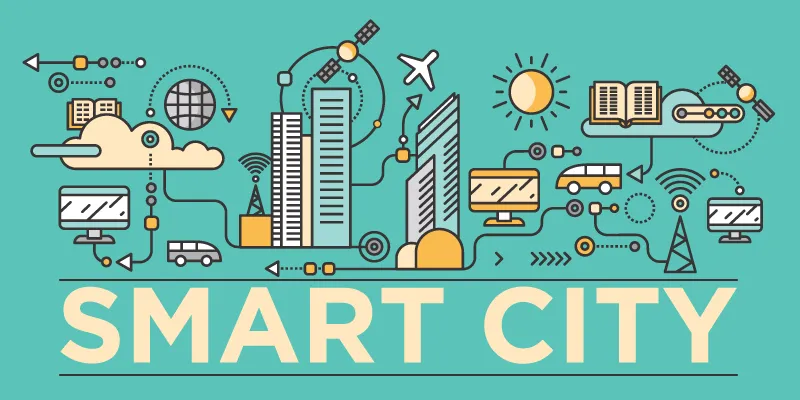Are we ready for smart cities?
SMART CITIES – the challenges and opportunity in redeveloping existing cities
Smart Cities, the flagship project of the new government, got a leg up with the recent unveiling of the top 20 winners at the smart city expo in Pune. The Prime Minister has said that this is a people’s movement and Minister for Urban Development Venkaiah Naidu has called it the urban renaissance. A lot is riding on this project, with massive funding commitment in redrawing India’s urban landscape.

The inclusion of slum rehabilitation, smart street and walkway plans, integrated commuting tracks, seamless mobility planning and more gives it a larger and broader appeal, especially if the existing city infrastructure needs to be upgraded.
In this context, let’s examine the challenges, opportunities and the building blocks that need to be put in place to realise the smart city vision.
A smart city is not about cutting-edge technology, gadgets guiding your lifestyle or using ICT (Information and Communications Technology) to string together man-machine interaction that will drive our socio-economic engagement in society. Yes, these techno-gadgets will definitely drive smartness in urban habitats and they will play an enabling role in driving the sustainable and smart habitat, but they are not the means to an end to the current haphazard urbanisation.
As I see it, there are a few key challenges that need to be addressed if smart cities are to see the light of day.
- Smart Citizens – For smart cities to function, we need smart citizens. Today, most of us don’t qualify for basic citizenry; we are not able to follow basic civilized rules, which we tend to break with impunity. So the challenge is to educate, enroll and engage citizens and help them in the transition into a smart city ambience. The smart city plans should address this key element before even attempting to fix other urban issues.
- Smart Local Governance– The sorry state of our cities, with their crumbling infrastructure, tells us that there is something wrong. Local bodies need empowering mandates to govern these cities, some of which have populations that are larger than several countries around the world. So treating the city and its governance with scant regard will not help. And running a smart city will be all the more expensive. So before filling cities with gadgets, sensors and more, the local governance needs big time sprucing up to be able to run and manage smart cities.
- Smart Finances – This is hardly talked about when it comes to cities; cities contribute to the bulk of State and Central revenues, yet they don’t get a proportionate share to manage and maintain themselves. Municipals need to have efficient tax collection, optimise revenue from services, have avenues to raise fresh finances and, more importantly, be accountable.
- Smart Planning – Cities in India have grown organically, nothing is planned. Chandigarh remains the only planned city (and that was over 60 years ago). Town planners need to think long-term, visualise growth over the next 30-50 years, envisage the hurdles and plan contingencies. The blueprint needs to be flexible to adapt and adopt new technologies in mobility and lifestyle so that we have enough room to accommodate technologies yet to be discovered into the city landscape. This means that we need to have smart city planners who understand the technology play, the aesthetics play, integrated mobility play and more. This is where private technology companies are pitching in to sell their wares on the smart city platform; but before that, the Urban Ministry should get a team of smart city planners who have the capacity, capability and bandwidth to realize this dream project.
- Smart Bureaucracy – The current mindset of governance needs to change; we need smart government officials who know that the running of the smart city rests on their shoulders. They need to be trained on leveraging technology applications and big data analytics to improve urban living and run a smart city for a long time after it has been built.
The list can go on; building a smart city from scratch is a lot easier than redevelopment or converting existing cities into smart cities. For that, we need to kill a lot of our old habits; the transition and transformation can be quite a daunting task. There is the issue of slum land, low cost housing, urban transportation, upgrading old city areas and buildings, sewage and civic infrastructure, power and electricity lines; everything needs an overhaul.
And as city dwellers, we are used to a number of things which come either free or subsidised – electricity, parking, water, garbage clearance and more. We know we are paying for many of these, but we don’t know the intricacies of the use of these monies. Is it effectively used for the purpose for which it is collected? The old Education Cess collected has some 12,000 crore sitting idle, the Swachh Bharat Cess has already crossed a couple of thousand crores.
So for smart cities to work, as a citizen I need to know that my input cost (what I am paying in terms of tax, cess, service fees etc) matches the output result (I get clean transport, my garbage is handled properly, parking and pedestrian areas are maintained etc). The contribution from the citizen in running many of the services of a smart city is going to matter a good deal, and for the citizen to cough up the extra monies, they need to see the value in smart cities.
So, as you can see, building smart cities is not so simple; we need to go beyond technology and gadgets and get a grasp of the real issues so that the foundation and building blocks of the smart city are there to stay for generations.
(Disclaimer: The views and opinions expressed in this article are those of the author and do not necessarily reflect the views of YourStory.)







